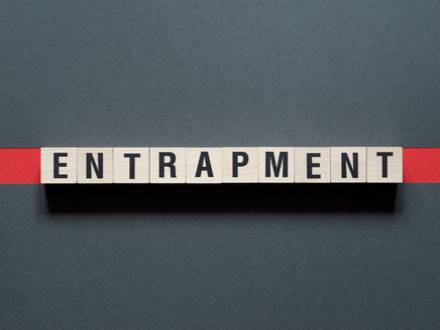Do I Have a Valid Entrapment Defense in My Illinois Criminal Case?
 When defendants argue that they were manipulated into committing a crime by the law enforcement officers investigating them, they can use a legal defense known as "entrapment." In Illinois, the defense is legally authorized to use entrapment as a legitimate defense as long as it has evidence to back the claims. To learn more about the legal requirements for an entrapment defense, speak with a qualified Aurora, IL criminal defense lawyer with experience helping other clients in similar cases.
When defendants argue that they were manipulated into committing a crime by the law enforcement officers investigating them, they can use a legal defense known as "entrapment." In Illinois, the defense is legally authorized to use entrapment as a legitimate defense as long as it has evidence to back the claims. To learn more about the legal requirements for an entrapment defense, speak with a qualified Aurora, IL criminal defense lawyer with experience helping other clients in similar cases.
What Does Entrapment Mean?
According to Illinois law, entrapment happens when a police officer, informant, or other government agent persuades an otherwise law-abiding individual into engaging in a criminal act. One important aspect of an entrapment defense is that the defendant would not normally have committed the crime, but the influence or pressure that was placed on him or her by law enforcement officers was what ultimately made him or her do what they did. If someone was simply given an opportunity to commit a crime, it would not be enough for an entrapment defense.
In Illinois, there are two important conditions that need to be established if you want to use an entrapment defense in your case:
Lack of Predisposition
One important aspect of an entrapment defense is that the defendant can demonstrate that he or she did not have a predisposition to commit the crime before the police officers got involved. If you had a history of similar criminal activity or you ultimately committed the crime without needing to be pressured into it, this would not likely be considered entrapment.
Inducement by Law Enforcement
You need to demonstrate that the police officers pressured you into committing the crime or encouraged you to do so. Again, this does not mean you were simply given the opportunity to commit a crime. You need to have been persuaded or coerced.
What are Common Examples of Entrapment?
Two of the most common examples of when entrapment is used involve drug cases and prostitution cases. For drug investigations, undercover cops often pose as either dealers or buyers to catch someone involved on either side of a drug transaction. If an undercover officer places significant pressure on someone to sell drugs, and that person is reluctant to do so but eventually gives in to the pressure, that could be entrapment. However, if the person was already dealing drugs and simply agreed to sell to the undercover officer as well, the case would likely be ineligible for an entrapment defense.
For prostitution or online solicitation cases, a police officer might create an elaborate scheme to get someone to commit a crime they otherwise would not. However, if an undercover cop arrests a sex worker, pimp, or client who would otherwise be doing the same thing, entrapment would not likely apply.
Schedule a Free Consultation with a Kane County, IL Criminal Defense Lawyer
Entrapment can be hard to prove, but an experienced Elgin, IL criminal defense attorney can review your case and advise you on how to proceed. At The Law Office of Brian J. Mirandola, we are passionate about protecting our clients’ rights and we will fight aggressively on your behalf. Call 847-488-0889 for a free consultation.








